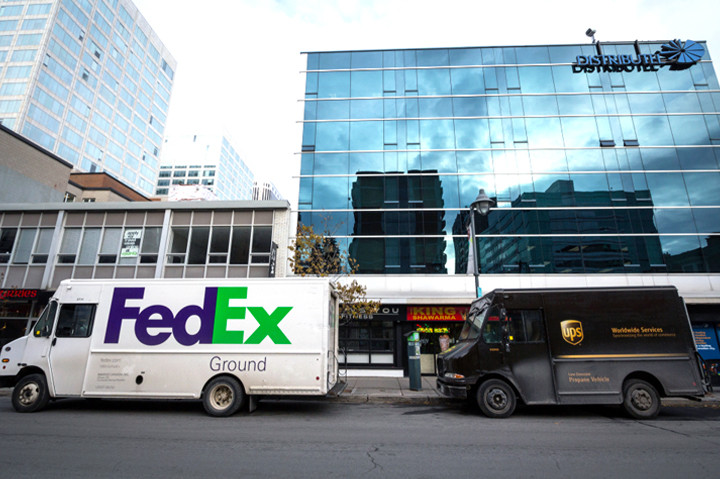Fuel Surcharges Rise, But Shippers Aren't Taking It Lying Down
FedEx and UPS, the delivery giants, have recently adjusted their fuel surcharge calculations, adding upward pressure on delivery prices. This comes despite a soft demand environment, which would typically give shippers more leverage in negotiations.
UPS has increased its fuel surcharge for U.S. ground and SurePost services by 175 basis points, a change that took effect on August 26. Meanwhile, FedEx's ground shipping fuel surcharges have also increased by a similar amount following adjustments made on September 2.
These increases are tied to the U.S. Energy Information Administration's average on-highway diesel fuel price. The carriers adjust their index-based fuel surcharges weekly, with fees tacked onto ground parcel shipments reflecting the fluctuations in diesel prices.
As an example, if the diesel fuel index's price per gallon is $3.30, a UPS SurePost delivery would now include a 16% markup. Five months ago, the same delivery would have had a 14.25% surcharge percentage.
A Growing Gap Between Surcharges and Fuel Prices
While the fuel surcharge increases are justified by rising diesel prices, a recent analysis by the TD Cowen/AFS Freight Index revealed a growing divergence between surcharges and the actual price of fuel. According to the index, FedEx and UPS' ground fuel surcharges would be 5.5% lower if they followed diesel prices more closely.
This suggests that the carriers are using the higher fees to offset the effects of lower demand and boost their revenue. In a June earnings call, FedEx EVP and Chief Customer Officer Brie Carere stated that fuel surcharge increases would be beneficial for the company's per-package revenue.
Shippers Finding Ways to Mitigate Costs
However, shippers are not simply accepting these higher fees. Despite the fuel surcharge increases, many have been successful in mitigating the impact on their delivery costs by securing lower shipping rates or exemptions from surcharge changes.
Parcel spend consultancy Shipware highlighted the carriers' increased openness to negotiating fuel surcharge discounts in a LinkedIn post last month. These discounts, previously reserved for the largest shippers, are now more widely available, offering a silver lining for businesses struggling with rising shipping costs.
The Rise of Space Commerce: A Baltimore Startup Aims to Be ‘FedEx for Space’
As space commerce continues to expand globally, a Baltimore startup, Space Phoenix, is making its mark with a vision to be the “FedEx for space”. With a target launch for its first satellite in spring 2025, Space Phoenix aims to make accessing space easier and more affordable for small and medium-sized businesses and organizations.
Simplifying Space Access
Space Phoenix’s model revolves around being a third-party logistics provider, offering a low-cost, fast turnaround solution. They help businesses get their payloads, which can be instruments for communications, data collection, or other purposes, launched and returned from space.
“The industry is massively constrained because there’s all this friction to get to space,” explained Andrew Parlock, Space Phoenix’s cofounder and CEO. “If you want to bring something to space, Space Phoenix’s model is do the thing that you do best … and then we’ll take care of everything else.”
A Swift Timeline and Reusing Proven Technology
Space Phoenix boasts a swift timeline. They are targeting a launch for their first satellite in spring 2025, after some flight model testing earlier that year. By 2026, they aim to launch a spacecraft, and by 2028, they plan to be sending one up once or twice a month.
The startup is not a rocket company, however, and will be outsourcing that part of the process. Parlock attributes the company's speed to their focus on reconfiguring existing technologies rather than developing entirely new ones.
“We’re trying to bring together proven technology in a novel package,” he said.
A Booming Market and Challenges Ahead
Space commercialization has been on the rise in recent years, driven by factors like the expected retirement of the International Space Station in 2030 and the emergence of commercial space stations, such as Axiom Space in Texas. This shift has created a need for infrastructure in space, including systems for manufacturing, refueling, and repairing.
Space Phoenix’s model aligns with this need. Parlock notes that one of the challenges facing the space commerce market is a lack of infrastructure.
“We’re hoping to reduce, get rid of those, or eliminate those constraints, or at least help eliminate those constraints,” he said.
Competitors and Differentiation
While Space Phoenix faces competition from established aerospace firms like SpaceX and Boeing, as well as smaller companies like Loft Orbital and the Exploration Company, Parlock believes their focus on cargo delivery differentiates them.
“We’re truly third party logistics for space,” he said.
The space economy is expected to be valued at $1.8 trillion by 2035, highlighting the potential of this market. Space Phoenix is currently focused on fundraising, seeking $10 million between a pre-seed and a seed round to fund its first launch. Parlock believes that using proven technologies allows them to operate with a lower capital requirement compared to traditional space companies.
Baltimore: A Hub for Space Commerce
Space Phoenix’s presence in Baltimore is strategic. Baltimore, known for its innovation and technology, particularly in the manufacturing and cybersecurity sectors, has attracted aerospace giants like Northrop Grumman. The region's proximity to federal agencies like NASA also provides valuable resources for space-related businesses.
Parlock highlights the city’s access to NASA and its supportive environment for startups.
“We’ve got the talent, we’ve got the scrappiness to do what space Phoenix is trying to do,” Parlock said. “Because we’re trying to change a market, and I think Baltimore’s the right place to do that.”
The Future of Space Commerce
As the space economy continues to grow, companies like Space Phoenix are poised to play a crucial role in making space more accessible and affordable. Their innovative approach to logistics, combined with Baltimore’s supportive environment, could lead to significant advancements in space commerce. With increasing private capital investment in low and medium earth orbit, the future of space exploration and commercialization is bright, and companies like Space Phoenix are at the forefront of this exciting new era.



















